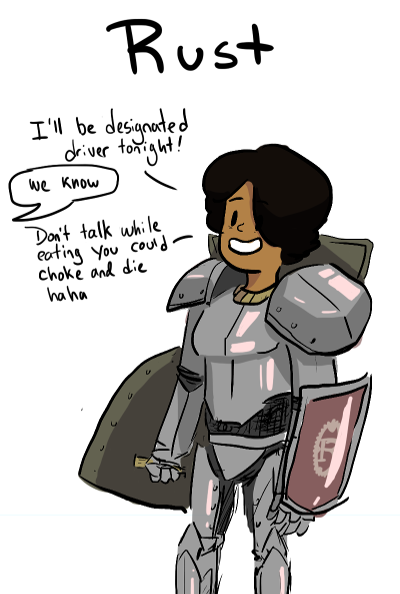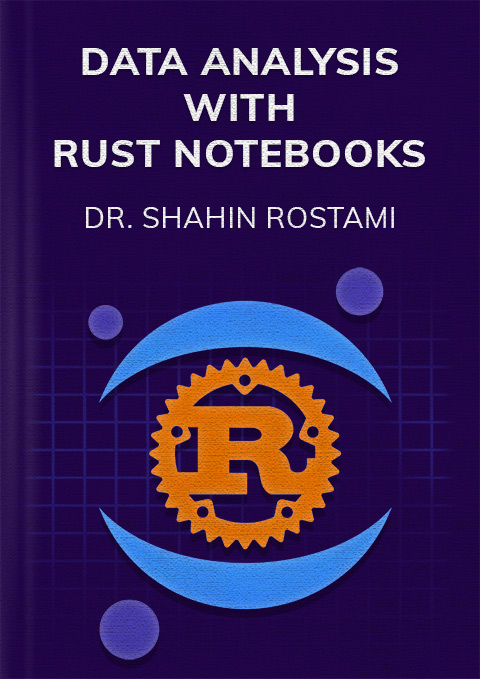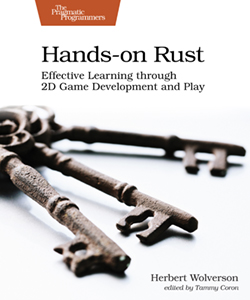Awesome Rust Books 

Rust Books
Books
Starter Books
The Rust Programming Language Free
Welcome! This book will teach you about the Rust programming language. Rust is a systems programming language focused on three goals: safety, speed, and concurrency. It maintains these goals without having a garbage collector, making it a useful language for several use cases other languages aren’t good at: embedding in other languages, programs with specific space and time requirements, and writing low-level code, like device drivers and operating systems. It improves on current languages targeting this space by having several compile-time safety checks that produce no runtime overhead while eliminating all data races. Rust also aims to achieve ‘zero-cost abstractions’ even though some of these abstractions feel like those of a high-level language. Even then, Rust still allows precise control like a low-level language would.
Welcome to Rust-101 Free
This is Rust-101, a small tutorial for the Rust language. It is intended to be an interactive, hands-on course: I believe the only way to really learn a language is to write code in it, so you should be coding during the course. If you have any questions that are not answered here, check out the "Additional Resources" below. In particular, the IRC channel is filled with awesome people willing to help you! I spent lots of time there ;-) I will assume some familiarity with programming, and hence not explain the basic concepts common to most languages. Instead, I will focus on what makes Rust special.
Rust by Example Free
Rust by Example (RBE) is a collection of runnable examples that illustrate various Rust concepts and standard libraries. To get even more out of these examples, don't forget to install Rust locally and check out the official docs. Additionally for the curious, you can also check out the source code for this site.
Easy Rust Free
Rust is a new language that already has good textbooks. But sometimes its textbooks are difficult because they are for native English speakers. Many companies and people now learn Rust, and they could learn faster with a book that has easy English. This textbook is for these companies and people to learn Rust with simple English.
Why Rust?
While systems programming languages have greatly evolved since the introduction of C more than 40 years ago, our capacity for dumb mistakes with enormous consequences has remained unchanged, with vivid examples regularly in the news. This O'Reilly report examines Rust, a new systems programming language that combines safety and security with performance on a par with C and C++.
Learning Rust

Rust is a highly concurrent and high-performance language that focuses on safety and speed, memory management, and writing clean code. It also guarantees thread safety, and it aims to improve the performance of existing applications. It has been backed by Mozilla to solve the critical problem of concurrency.
Beginning Rust - From Novice to Professional
Learn to program with Rust in an easy, step-by-step manner on Unix, Linux shell, macOS and the Windows command line. As you read this book, you’ll build on the knowledge you gained in previous chapters and see what Rust has to offer.
Beginning Rust starts with the basics of Rust, including how to name objects, control execution flow, and handle primitive types. You’ll see how to do arithmetic, allocate memory, use iterators, and handle input/output. Once you have mastered these core skills, you’ll work on handling errors and using the object-oriented features of Rust to build robust Rust applications in no time.
Only basic knowledge of programming is required, preferably in C or C++. To understand this book, it's enough to know what integers and floating-point numbers are, and to distinguish identifiers from string literals.
Rust Cookbook

This book will help you understand the core concepts of the Rust language, enabling you to develop efficient and high-performance applications by incorporating features such as zero-cost abstraction and better memory management. Delve into advanced-level concepts such as error handling, macros, crates, and parallelism in Rust. Toward the end of the book, learn how to create HTTP servers and web services, building a strong foundational knowledge in server-side programming and enabling to deliver solutions to build high-performance and safer production-level web applications and services using Rust.
Rust Standard Library Cookbook

Mozilla’s Rust is gaining much attention with amazing features and a powerful library. This book will take you through varied recipes to teach you how to leverage the Standard library to implement efficient solutions.
The book begins with a brief look at the basic modules of the Standard library and collections. From here, the recipes will cover packages that support file/directory handling and interaction through parsing. You will learn about packages related to advanced data structures, error handling, and networking. You will also learn to work with futures and experimental nightly features. The book also covers the most relevant external crates in Rust.
Network Programming with Rust
Rust is low-level enough to provide fine-grained control over memory while providing safety through compile-time validation. This makes it uniquely suitable for writing low-level networking applications.
This book is divided into three main parts that will take you on an exciting journey of building a fully functional web server. The book starts with a solid introduction to Rust and essential networking concepts. This will lay a foundation for, and set the tone of, the entire book. In the second part, we will take an in-depth look at using Rust for networking software. From client-server networking using sockets to IPv4/v6, DNS, TCP, UDP, you will also learn about serializing and deserializing data using serde. The book shows how to communicate with REST servers over HTTP. The final part of the book discusses asynchronous network programming using the Tokio stack. Given the importance of security for modern systems, you will see how Rust supports common primitives such as TLS and public-key cryptography.
Rust Programming by Example

Beginning with an introduction to Rust, you’ll learn the basic aspects such as its syntax, data types, functions, generics, control flows, and more. After this, you’ll jump straight into building your first project, a Tetris game. Next, you’ll build a graphical music player and work with fast, reliable networking software using Tokio, the scalable and productive asynchronous IO Rust library.
Throughout this book, you’ll explore various features of Rust Programming including its SDL features, event loop, File I/O, and the famous GTK+ widget toolkit. Through these projects, you’ll see how well Rust performs in terms of concurrency—including parallelism, reliability, improved performance, generics, macros, and thread-safety. We’ll also cover some asynchronous and reactive programming aspects of Rust.
Rust Quick Start Guide

Get familiar with writing programs in the trending new systems programming language that brings together the powerful performance of low-level languages with advanced features like thread-safety in multi-threaded code.
Rust in Action

Rust in Action is a book for intermediate programmers who want to explore the world of the Rust programming language. It's intended for people who may have exhausted the free material on the web, but who still want to learn more. It's is different from other material on Rust programming because it also teaches you about systems programming along the way. You'll be able to learn more about how a CPU works, how computers keep time, what pointers are and how your network card and keyboard tell the CPU that they have input ready to read.
It’s unique from the point of view of systems programming books too - as almost every example works on Windows! If you are the kind of learner who enjoys worked examples, you'll enjoy reading this book.
A Gentle Introduction to Rust Free

Rust is a statically and strongly typed systems programming language. statically means that all types are known at compile-time, strongly means that these types are designed to make it harder to write incorrect programs. A successful compilation means you have a much better guarantee of correctness than with a cowboy language like C. systems means generating the best possible machine code with full control of memory use. So the uses are pretty hardcore: operating systems, device drivers and embedded systems that might not even have an operating system. However, it's a very pleasant language to write normal application code in as well.
The big difference from C and C++ is that Rust is safe by default; all memory accesses are checked. It is not possible to corrupt memory by accident.
Introduction to Rust for Python programmers (Korean, 한국어)
The book introduces various Rusts examples and their equivalents of Python, to help understanding the core concepts of the Rust lanugage.
Practical Machine Learning with Rust: Creating Intelligent Applications in Rust

Machine Learning in Rust has been neglected for quite some time by the community. With many disparate crates scattered through the cosmos, this book is an attempt at unifying all the information and usages that are out there and kind of shake the community into action. Data is the new frontier and Rust has to be a part of that.
After reading Practical Machine Learning with Rust, you will have a solid understanding of creating high computation libraries using Rust. Armed with the knowledge of this amazing language, you will be able to create applications that are more performant, memory safe, and less resource-heavy.
Rust Web Development

Rust Web Development is a hands-on guide to building server-based web applications with Rust. If you’ve built web servers using Java, C#, or PHP, you’ll instantly fall in love with the performance and development experience Rust delivers. This book shows you how to work efficiently using pure Rust, along with important Rust libraries such as tokio for async runtimes, warp for web servers and APIs, and reqwest to run external HTTP requests.
You can hand this book over to your newly hired developer and onboard them with this book. It contains very practical examples and patterns, and serves as a solid foundation for future exploration into the topic.
Refactoring to Rust

Refactoring to Rust teaches you to combine your favorite programming language with high-performance Rust code. Author Lily Mara introduces Rust in her easy-to-read style, clearly explaining the language's unique syntax and concepts. You’ll augment programs with Rust hands-on with approachable examples like solving FizzBuzz with Rust’s pattern matching and gaining enormous runtime speedups to Python code. When you’re done, you’ll have mastered techniques for building Rust plugins you can apply to all kinds of existing software, from games to data tools.
Learn Rust in a Month of Lunches

Learn Rust in a Month of Lunches is a fast and friendly guide to Rust proficiency. Each lesson introduces a new feature of the language, from working with types to making sense of the Rust standard library. The book's examples are easy and fun to follow—such as explaining traits using role-playing game characters. Best of all, almost all code samples run in the browser-based Rust Playground. No need to install Rust to get started on a lesson!
Data Analysis with Rust Notebooks

A practical book on Data Analysis with Rust Notebooks that teaches you the concepts and how they’re implemented in practice. It includes a section on getting your environment set up, and full code listings for all examples.
Rust Web Programming

This book will take you through each stage of the web development process, showing you how to combine Rust and modern web development principles to build supercharged web apps.
You'll start with an introduction to Rust and understand how to avoid common pitfalls when migrating from traditional dynamic programming languages. The book will show you how to structure Rust code for a project that spans multiple pages and modules. Next, you'll explore the Actix Web framework and get a basic web server up and running. As you advance, you'll learn how to process JSON requests and display data from the web app via HTML, CSS, and JavaScript. You'll also be able to persist data and create RESTful services in Rust. Later, you'll build an automated deployment process for the app on an AWS EC2 instance and Docker Hub. Finally, you'll play around with some popular web frameworks in Rust and compare them.
Command-Line Rust: A Project-Based Primer for Writing Rust CLIs
Learn how to recreate popular command line tools with Rust using TDD. The first chapter teaches you how to setup, run, add dependencies, and test a project with Cargo; this chapter also teaches you what it means to make a successful command line tool (exit values, POSIX compliance, composability). In the subsequent chapters you will recreate CLTs such as cat, find, tail, grep, cal, and many others. The author describes how to write tests in rusts and will provide test suites in later chapters to assist in developing with TDD. Each chapter introduces a new concept from Rust to assist in creating the CLT.
The book assumes no prior knowledge of Rust, but does require previous programming experience.
Hands-on Rust

Each chapter in this book presents hands-on, practical projects that take you on a journey from "Hello, World" to building a full dungeon crawler game. Start by setting up Rust and getting comfortable with your development environment. Learn the language basics with practical examples as you make your own version of Flappy Bird. Discover what it takes to randomly generate dungeons and populate them with monsters as you build a complete dungeon crawl game. Run game systems concurrently for high-performance and fast game-play, while retaining the ability to debug your program. Unleash your creativity with magical items, tougher monsters, and intricate dungeon design. Add layered graphics and polish your game with style.

 访问官网
访问官网 Github
Github










